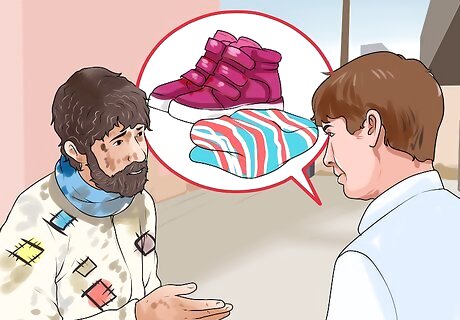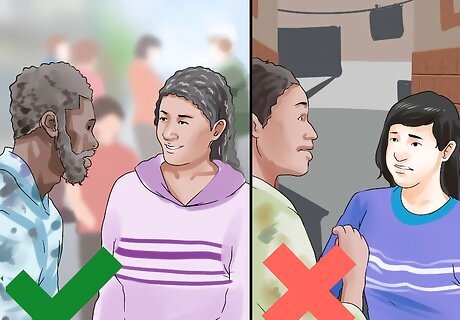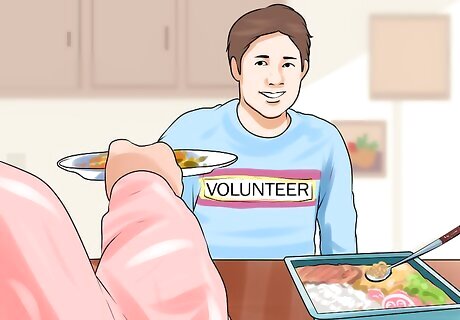
views
X
Research source
By treating beggars with dignity, exercising some street smarts, and working with local charities and shelters, you can make a difference.
- Don’t ignore beggars if you can; nod, smile, and communicate with compassion.
- Explain that you don’t have any money, or that you’ve only got credit cards on you.
- If a beggar becomes aggressive, do not hesitate to alert the police, run, or solicit help from others nearby.
- Donating to shelters and charities, or offering beggars food or water, can be much more helpful than giving someone loose change.
Dealing with a Direct Encounter

Acknowledge the beggar. Instead of ignoring them, look at them. Nod, smile, or say hello to show you are aware of their presence. This is a compassionate response that won’t cost you any money.

Refuse to give money politely. A flat “No” to their request might seem rude and uncaring. Instead, try something like, “I’d like to help, but I don’t have any cash.” It’s respectful, and it allows you to avoid feeling like a villain.

Ask the beggar what they need. You could give your spare change, but you can’t control what it will be used for. Instead, if it’s safe to do so, ask what they would like to buy. If they need a bus ticket, offer to buy one for them. If they’re wearing shoes in poor condition or covering themselves with newspapers, ask their shoe size or offer to bring a blanket. This sees to their physical needs and also gives them the dignity and respect that money can’t buy.

Offer food. If you’re near a restaurant or café, offer to buy a cup of coffee or a sandwich. This will allow you to address the beggar in a way that’s helpful and open. You also can at least be assured they’ll have food or a warm beverage. Keep in mind some beggars may trade food for other goods or services. You can’t control this once you hand them the food. This doesn’t happen all the time, but it’s good to keep this in mind so you are aware of the possible downsides of giving a beggar food.

Direct the beggar to a shelter. If you think they might be sleeping on the street, let them know the location of the nearest homeless shelter. This will help them get off the streets, at least for a night. It will also connect them with services that could give them the means to rise out of their situation. To find shelter locations around the world, visit: Street Link for UK shelters. Homeless Shelter Directory for shelters in the United States. Homeless Canada for shelters in Canada.
Keeping Yourself Safe

Stay where people can see you. Speak with beggars on busy, well-lit streets. Remain standing, as crouching or sitting makes you less visible. Don’t follow anyone into an empty alleyway or dark corner.

Keep your eyes on the beggar. If you’re giving directions or handing over some food, don’t look away from the beggar. Distraction is a common tactic thieves use to rob victims with good intentions. While most beggars aren’t criminals, you should always use caution.

Remain in your car. While driving, you might be tempted to help a beggar at a traffic light by getting out of your car. This holds up traffic and puts you in danger of a traffic accident. Acknowledge them with a nod or a smile, but do it from your car.

Protect yourself from aggressive beggars. If a beggar becomes aggressive, you shouldn’t allow yourself to be bullied. Shout to draw attention to yourself. Walk into a nearby business and ask for assistance. If you see a police officer in the area, tell them about your situation.
Donating to Charities or Shelters

Give money to a local charity. Look for charities that help people stay off the streets and provide support for the homeless. If you’re concerned about beggars in a country you’re visiting, look for a charity that focuses on a specific need, such as providing school books and supplies for children. This will keep them in school and off the streets. To ensure your money will go where it’s needed, you could check out: Charity Navigator, which rates charities based on their level of success and follow through. A list of top rated charities from around the world, located at GivingWhatWeCan.org.

Support a homeless shelter. Donate money. This will help to improve your community and give you a way to support homeless people in your area. You can also donate items other than money. You could consider: Oral hygiene products like toothbrushes, toothpaste, and dental floss. Personal hygiene products like baby wipes or sanitary napkins. First aid supplies like bandages and antiseptic wipes. Clothing, especially old winter coats and shoes.

Volunteer at a shelter or a local charity. You can serve meals, help sort through donations, and provide other services as needed. Contact your local shelter for volunteer opportunities. Get involved with charities that you donate to so you can feel the direct impact of your financial donation.




















Comments
0 comment